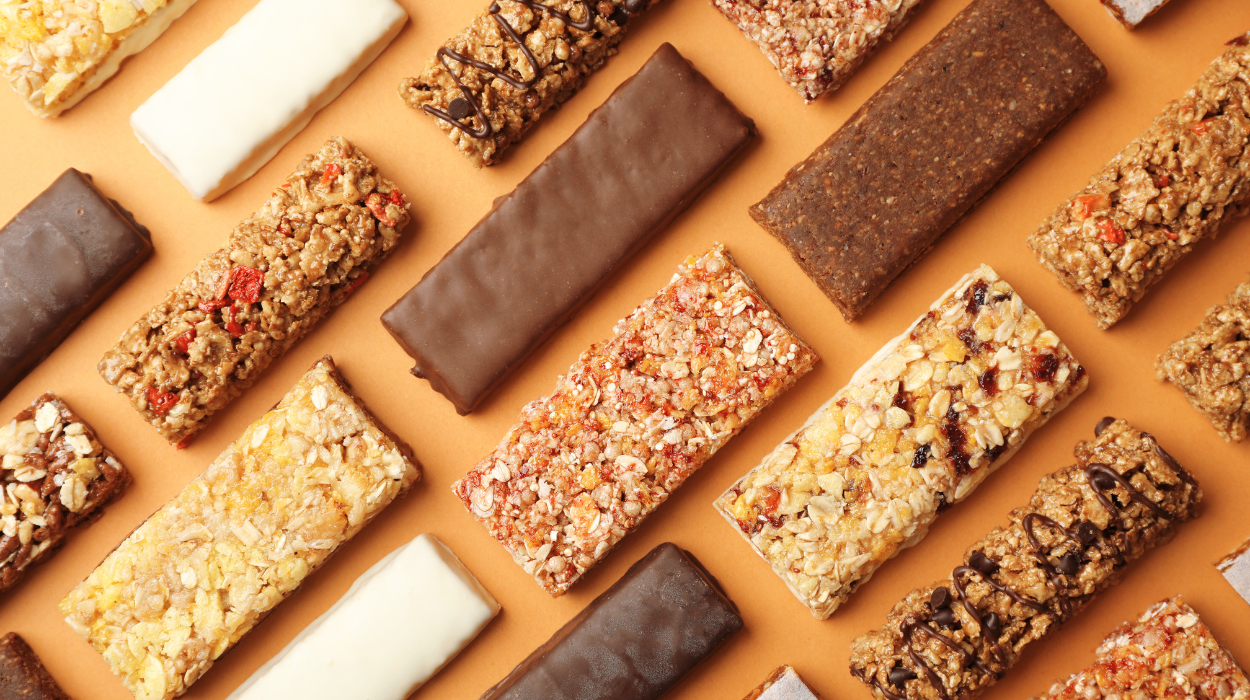If you want to lose weight, consider including a quality source of protein in your diet. The reason why protein is important for weight loss is because it increases satiety for longer than fats and carbohydrates. It also burns many calories[1] during digestion and absorption, called a thermic effect.
Eggs, almonds, milk products, seafood, and lean meats are common protein sources. Some people, however, get their protein from supplements such as protein bars. But are protein bars good for weight loss? After all, they are similar to candy bars,[2] which are known to cause weight gain.
Protein bars can aid with weight loss. However, their success in promoting weight loss depends on various factors.
Are Protein Bars Good For You To Lose Weight?
Yes, eating protein bars can help with your weight loss journey. They induce satiety, manage hunger cravings, and support lean muscle mass.
You should, however, consider how much protein is in your preferred protein bar option.
Also, you should select options that are low in carbs, low in calories, and free of unhealthy fats and added sugars.
Are Protein Bars Good For Weight Loss?

Protein bars with a high protein content can help with weight loss. According to research studies, most people need about 1.2-1.5 grams[3] of protein per kilogram of body weight. Athletes may need more than this.
The more protein you consume, the fuller you will feel and the less likely you will be to overeat. However, eating too much protein could lead to weight gain if it takes you out of a calorie deficit. More protein is not necessarily better.
While choosing protein bars with a high protein content is advantageous, you must also look at the entire nutritional profile. Some protein bars, for example, include an excessive amount of added sugars, which can contribute to obesity and heart disease.[4]
Other protein bars are high in saturated fats. This means that an ideal protein bar to support weight loss should be low in sugar and high in healthy fats like those found in nuts.
Some protein bars are higher in calories than others. The former is meant to be a meal replacement, whilst the latter is intended to aid in weight loss.
The Nutritional Value Of Protein Bars
Protein bars are available in a variety of flavors. As a result, their nutritional values will differ because not all protein bars are manufactured similarly. Nonetheless, protein bars share common components and quantities.
Protein bars typically contain 150-300 calories per serving. The calorie count varies depending on the type of fat or sweetener used, protein composition, and extra components such as nuts or dried fruit. If you want to reduce weight, choose a protein bar with 150 calories or fewer.
Protein bars may also contain sugar. Some producers utilize natural sweeteners, while others use added sugars or artificial sweeteners. Choose one with fewer than 10 grams of sugar per serving to reduce weight.
Some protein bars contain fiber, which aids digestion and satiety.[5] Although fiber is beneficial, too much fiber[6] can cause bloating, cramping, and constipation. Select a protein bar containing 3-5 grams of fiber per serving.
Protein bars contain fats from healthy and unhealthy sources. The former comprises nuts and seeds, while the latter includes palm and hydrogenated oils.
If you want to lose weight, eat a protein bar with a reduced fat content[7] known to improve satiety. However, because all fats include a lot of calories, they must be consumed in moderation.
Carbohydrates are also present in protein bars. Lower amounts of carbohydrates are desirable and may offer a better balance of healthy fats, fiber, and protein. Feelings of fullness will result from the presence of these nutrients.
What Are The Best Protein Bars For Weight Loss?

Selecting the best protein bar might be difficult because many of them are on the market. This is because many producers assert that their protein bars are superior to others. Here are some aspects to consider while selecting the best protein bars for weight loss.
Sugar Level
A good-quality protein bar should contain minimal sugar. Overindulgence in sugary protein bars can lead to obesity. Obesity[8] increases the risk of developing health conditions such as high blood pressure, stroke, gallbladder disease, coronary heart disease, and stroke.
Low-sugar protein bars not only help prevent obesity but also minimize abrupt blood sugar rises.[9] You may feel tired and hungry due to these changes in blood sugar. In some cases, you end up overeating as a result of blood sugar fluctuations, which can lead to weight gain.
Balanced Macronutrient Profile
As we’ve already shown, consuming protein bars with excessive sugar can impede your efforts to lose weight. Unfortunately, the effects of consuming too much sugar extend beyond weight.
Too much sugar in a protein bar also means insufficient room for essential nutrients[10] like proteins and healthy fats. Without these nutrients, you risk developing a weaker immune system or chronic illnesses.
Calorie Level
A lower-calorie protein bar is the best option for those trying to lose weight. This will make it easier to stick to the calorie deficit required for weight loss. When you’re in a calorie deficit, you lose weight because your body is compelled to use stored fat as energy.
Tips To Keep In Mind
What are the similarities between protein bars and weight loss supplements? Some people rely entirely on them to lose weight.
However, losing weight is time-consuming and involves multiple strategies, such as healthy diets and physical exercise.
Here are some tips to keep in mind:
Pair Protein Bars With Whole Food Sources
Many people make a habit of eating too many protein bars making it harder to lose weight. For best results, protein bar consumption should be paired with other high-protein foods for weight loss, such as eggs, low-fat dairy, and lean meats.
Snacks may also help with weight loss by helping you stay full between meals. Consider adding high-protein snacks like cheese, pumpkin seeds, and egg bites for weight loss.
Additionally, protein powders could help you lose weight in the same manner as protein bars. When combined with your meals or snacks, you will feel fuller for a longer period of time. Whey protein, casein protein, and egg white are some of the best protein powders available, with all of these high-quality protein sources containing all 9 essential amino acids.
Consider The Different Flavors
Eating healthy doesn’t have to be boring. The flavor is vital to consider when selecting a protein bar. If you don’t like the taste of a protein bar, you may turn to other less healthy foods. You may also make your own protein bars to get the right flavor and ingredients for your dietary needs.
You may find that protein bars sweetened with artificial sweeteners, such as saccharin or Ace-K, are bitter or overly sweet. Consider this when selecting your protein bar.
Always Keep Allergic Reactions In Mind
Protein bars contain various components that may cause allergic reactions, such as gluten, nuts, soy, or milk. If you have allergies, you must read the ingredient labels.
Some protein bars contain gluten derived from rye, barley, or wheat. When selecting a protein bar, be sure the label says gluten-free if you have gluten allergies.
Think About The Textures
Another aspect to consider is texture. Texture,[11] like flavor, impacts whether or not you will be satisfied after consuming a protein bar. A grainy protein bar is less satisfying than one with a smooth feel.
Consider Other Users’ Feedback
It might be difficult to judge the flavor of a protein bar, which is why some people prefer to read customer reviews online. Reviews include all the information you’ll need, such as allergy information, value for money, flavor, and quality.
Consider The Price
Another element to consider when choosing a protein bar is the price. If you intend to consume protein bars daily, you must be prepared to spend a significant amount of money on them.
It may be helpful to select slightly more expensive protein bars. Expensive protein bars are more likely to contain high-quality ingredients. However, it never hurts to double-check the ingredient list to ensure it is low in sugar and contains healthy fats.
Keep An Eye Out For The Expiry Dates
Protein bars have a longer shelf life than conventional food, but they can still spoil. As a result, you should double-check the expiration date. Protein bars lose texture, taste, and nutritional value as they go bad.
In addition to the expiration date, protein bars spoil when exposed to heat and moisture. Be sure to store them in a cool, dry location.
Drink Plenty Of Water To Stay Hydrated
Some protein bars, particularly those containing whey, induce mouth dryness.[12] To avoid this, be sure to drink plenty of water. Aside from relieving mouth dryness, water aids in the transportation of nutrients from the protein bar to the rest of the body.
Consider your exercise level and body weight when deciding how much water[13] to drink. Strive to consume between 2 liters and 3.7 liters of water per day, depending on sex, heat, and activity.
Conclusion
So, are protein bars good for you to lose weight? Because of the nutrients they contain, they can be excellent supplements for weight loss.
You must read the nutrient label of each protein bar you purchase. If it has too much-added sugar, you may gain weight instead of losing it.
Certain protein bars are low in calories. As a result, you’ll consume fewer calories, which helps with weight loss. Check the ingredient list to see how many calories a protein bar contains.
Protein bars cannot assist you in losing weight on their own. This is because they lack many nutrients commonly found in a healthy diet. However, they may help with weight loss if consumed as part of a balanced diet with a calorie deficit.
Losing weight also requires frequent exercise,[14] which burns calories faster than protein bars. As a result, you should only employ protein bars as part of your overall strategy.
Frequently Asked Questions
Protein bars are high in macronutrients,[15] including fats, proteins, and carbs. These nutrients promote satiety, which causes you to eat less food and helps your body burn calories by utilizing stored fat, resulting in weight loss.
You can consume a protein bar daily if it fits your nutrient and calorie requirements.
While convenient and portable, protein bars cannot substitute for a meal. However, you can temporarily use a protein bar as a meal replacement with balanced macro- and micronutrients if you have difficulty preparing a meal.
Protein intake through protein bars may be fattening depending on their nutritional value. If you don’t want to gain weight, ensure they’re low in fat, calories, and sugar.
Yes, if this is your goal, you should consider purchasing a high-protein bar.[7] A protein bar with balanced micronutrients, on the other hand, is excellent for meal replacements.
 Evidence Based
Evidence Based
